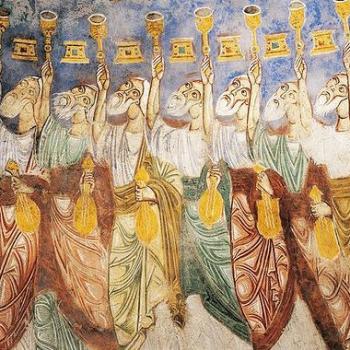Did I Belong to a Cult? The Story (in Brief) of My Spiritual Journey (Or How I Survived Spiritual Abuse but Still Bear the Scars) Part Four (Final)
Having now told my story of spiritual abuse at the hands of trusted spiritual mentors, I will reflect on it theologically and practically. That is, I will offer some thoughts about God’s role in what happened to me—to help others think about how best to consider God’s plan, purpose and involvement in difficult situations—and about handling spiritual abuse in religious systems.
Where was God in my spiritual journey that included four years of misery in Bible college? Don’t get me wrong; it wasn’t all misery. When I say “four years of misery” I don’t mean “nothing but misery” but a constant misery—like a toothache. So why didn’t I just leave?
People who ask that question of people caught in cult-like religious systems do not understand the situation. Often such people have been conditioned by their religious system, which is often their only source of social contact, to believe that if they leave they may suffer eternal loss. That is, their salvation is dependent on remaining within the group. Or, they may have been conditioned to believe that leaving the group will result in loss of fellowship with God—even if their salvation is secure. Finally, they may believe that the group that is abusing them is their family and think that outside of it they will be alone.
I was raised to believe that loyalty to the denomination was a condition of loyalty to my family and even to God. Leaving the college was tantamount to leaving the denomination which was tantamount to leaving my family. I also knew that many people I cared about believed loyalty to the denomination was, at least in my case (having grown up in it and my family being so “big” a part of it), tied together with my spirituality. All that is to say that part of the reason I stayed, in spite of the spiritual abuse, was fear—of what my family and spiritual mentors would think, that they would disown me, that I would be alone, and that my spiritual connection with God would suffer if not be broken. I’ve heard all that from many victims of spiritual abuse in religious systems.
But there’s something else. I also stayed because I strongly believed God wanted me there—not to be abused or given a bad education—but for his own purposes. I did try to leave once. I transferred to another college far away and actually moved into its residence hall and prepared to begin classes. A few days before classes began I felt God calling me back. I returned to the Bible college knowing what was in store for me there. My only comfort was that I knew in my heart that was God’s will for me. Leaving was my will; staying was God’s will.
“God moves in mysterious ways his wonders to perform. … Judge not the Lord by feeble sense, but trust him for his grace.” That’s all I could do at that time. I could only take comfort in the belief that “Someday He’ll make it plain to me….” I realize how super-spiritual all that sounds, but it’s still very real and true to me. I suffered through three more years of sometimes harsh spiritual abuse at the hands of people I trusted to have my best interests at heart. Many of them proved they did not because, instead of nurturing and guiding me, they punished me for asking questions and pointing out very serious problems throughout the dysfunctional institution.
I will never regret returning to the college and staying, in spite of the misery it inflicted on me. It was truly my cross to bear in those callow years of my youth. Oh, of course, I know it was nothing compared to what many people suffer. This was the suffering God permitted for me because that was where he wanted me to be at that time. As I look back at it all from this perspective, many years later and with much more maturity, I feel strongly that God sustained me through it all in spite of the abuse. “He giveth more grace when the burdens grow greater….” From God’s perspective, what I was suffering was minor compared to the purpose for which he placed and kept me there.
None of that justifies the spiritual abuse, however, and eventually nearly all my (and others’) abusers in that system fell. Unfortunately for me, by that time I had an undeserved reputation within the denomination for being “rebellious,” “contentious,” and “disloyal.” I say “undeserved” because I also believed strongly then and still believe God called me, assigned me, to raise questions and challenge many things in that dysfunctional system. I wasn’t alone; many other students, some faculty members and a few pastors also raised questions and challenged the dysfunctions in the system.
Eventually, after graduation and while pursuing my Ph.D. in Religious Studies at a major secular university, I left the denomination and joined a Baptist church. Because I graduated from a Baptist seminary I gained ordination with that church and recognition of that church’s ordination from the ABCUSA (American Baptist Churches, U.S.A.). I only left my home denomination and Pentecostalism because they told me I had no future there. I was still evangelical but not truly Pentecostal anymore in the “classical sense” of believing that speaking in tongues is the “initial, physical evidence” of the “infilling of the Holy Spirit.” I knew many ministers in my home denomination who also did not believe that, but they were not as open about it as I was. Ironically, years later, the denomination changed its statement of faith to soften that stance, allowing the possibility that someone may be truly Spirit-filled without speaking in tongues.
I understand if some people struggle with the idea that being and remaining within a cultic religious system could ever be God’s will. Many will think I stayed out of weakness or being brainwashed, etc. All I can say is that I knew then and I know now that it was God’s will for me to be there and go through that. I don’t claim to know why. I have my suspicions and thoughts about it, but I can’t say for sure. One thing I can say for sure is that had I not gone there and stayed I would not have married my perfect wife or had my perfect daughters. So even if that was the only reason, it was well worth it.
I strongly believe that God does guide us if we let him and that often it is not through “shady, green pastures” but through “the valley, the darkest of night.” I do not think God particularly cares about our comfort. He calls us to “Take up thy cross and follow me.” Our response should be “How can I make a lesser sacrifice, when Jesus gave his all?”
So what advice do I give to Christians caught in dysfunctional, abusive religious systems? First, ask yourself and God whether that is where you belong. Is God calling you to be and remain there? If so, if you strongly feel it to be so, then by all means stay. Ask God what he wants you to do there. Second, if you believe God wants you there, protest ethical abuses and spiritual abuse. Don’t be quiet about it. I do not believe ethical abuse and spiritual abuse is ever God’s will. He may want you there, but the dysfunctionality of the system is not God’s will and he very well may be calling you to fight against it from within. Be prepared to suffer. As much as possible, by God’s grace, keep a good spirit “through it all.”
Third, if God is not clearly calling you to stay in such a system, escape it as quickly as possible. Find a church, a spiritual home, that is not abusive and that even understands the dangers of religious power-over, dominating, abusive power. Get pastoral counseling to heal the wounds; know that you may bear some scars forever. Get comfortable with them. Read The Subtle Power of Spiritual Abuse by Jeff Van Vonderen and David Johnson. Focus your attention on God’s grace and away from denominational loyalty and spiritual performance. Also read Tired of Trying to Measure Up by Van Vonderen. Using self-talk, convince yourself, with God’s help, of course, that your being loved and accepted by God is not dependent on belonging to any particular church or denomination.
Now, to all others—people not caught in dysfunctional, abusive, cult-like religious systems: Strictly avoid churches and religious groups that even imply that loyalty to them is a condition of having a healthy spiritual life or relationship with God. God’s people, the church of God, of Jesus Christ, is bigger than any denomination or congregation or college or institution.
One reason dysfunctional, abusive religious systems exist is people’s tendency to put too much trust in powerful, charismatic religious leaders, and give too much loyalty to religious institutions. We need to hold lightly enough to our religious affiliations that when/if they become dysfunctional and abusive we can leave without pain or regret (unless, of course, God is calling us to remain in which case we still should not invest too much in them in terms of trust and loyalty).
Also, and finally, to those not caught in cult-like religious systems, please try to understand those who were and are. Understand that there is a dynamic at play in the manipulation of people’s religious feelings and needs such that many people become caught in such systems and cannot escape or have escaped but feel tremendous pain over it. Every person I have met who escaped from such a cult-like religious system testifies to having fear about their spiritual condition because, even if only for a fairly brief period of time (if that was the case), they were convinced that their spirituality, their relationship with God, was at stake in staying within the group and under the control of its leaders. That is not easy to overcome; often the fear and pain return like PTSD. Have sympathy, listen to them, encourage them to believe that God loves them and that their spirituality is not dependent on belonging to any particular religious group.
















